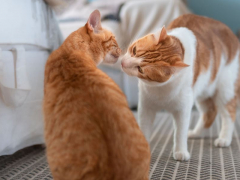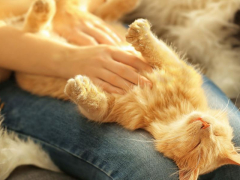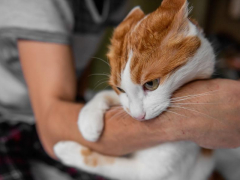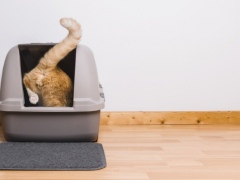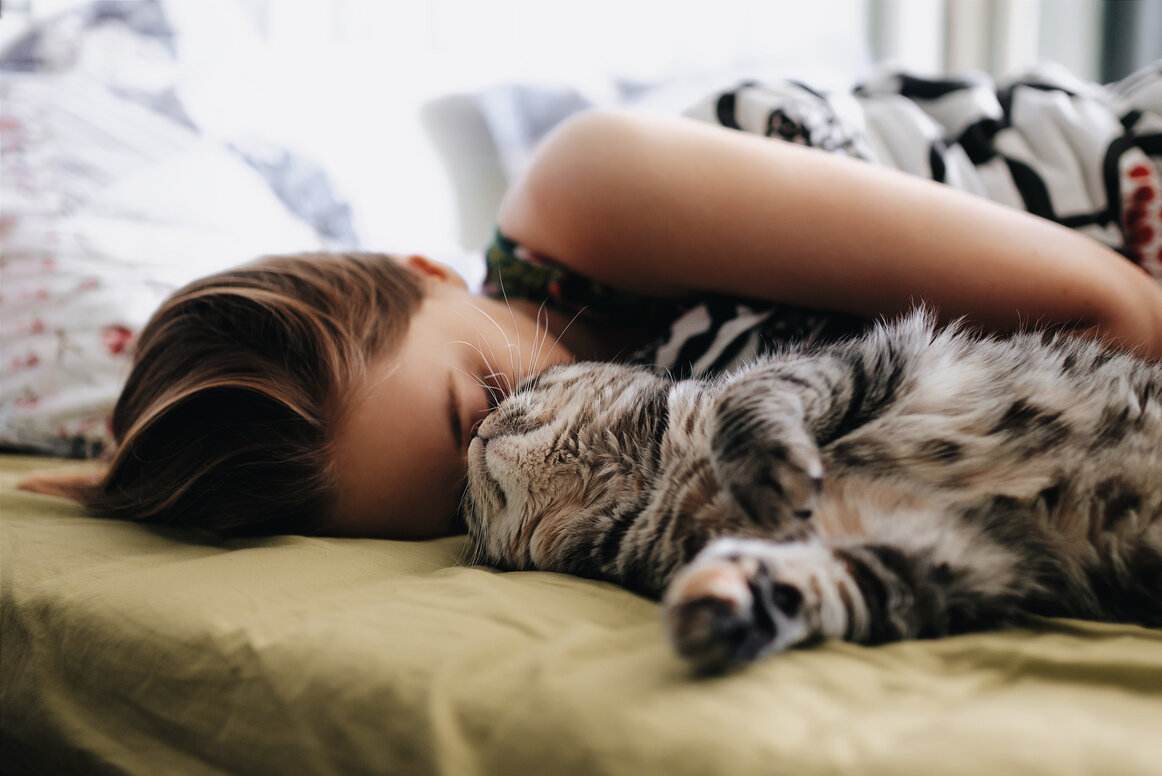
If your cat likes it, petting and cuddling are great ways to show you love them.
When we share our home with cats, they quickly take over every space. Your bed may be one place that they claim for themselves. Have you ever woken up to your cat snoozing on or by your head? Did you wonder why they get up close and personal in this way?
There is currently no scientific research to tell us exactly why cats like to sleep on our heads. However, based on their instincts and behaviors, there are some good theories as to why.
They Want To Absorb Your Warmth
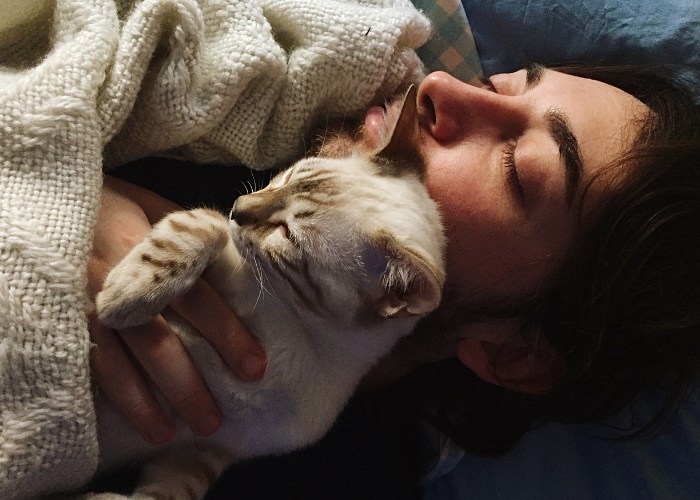
Your cat’s normal body temperature is higher than ours, ranging from 100.5-102.5F.
Cats are attracted to warm spots. In the summer, you’ll often find them basking in the sunlight for hours. In the winter, they might be cozied up next to the radiator or in front of the fireplace. Your cat’s normal body temperature is higher than ours, ranging from 100.5-102.5F.
Also Read: Cat Body Temperature: Causes & Treatment of Abnormal Body Temperature
Naturally, cats will view your body heat as an ideal source. During the day, your cat may curl up on your lap. At nighttime when you sleep, you are tucked snugly under the blankets, usually with just your head exposed. And so, it makes sense that your cat will feel inclined to drape themselves over your head. Either that or they will snuggle up on your pillow close to the top of your head.
They Feel Safe And Secure Next To You
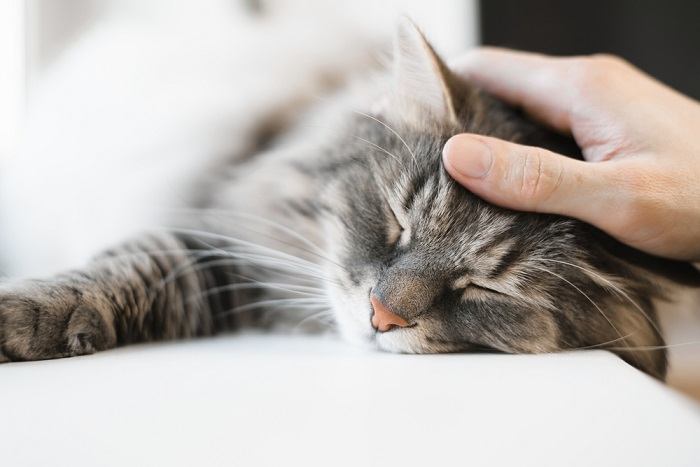
In the wild, sleeping is a vulnerable time and leaves animals open to being attacked by predators.
In the wild, sleeping is a vulnerable time and leaves animals open to being attacked by predators. Sleeping beside you at bedtime can indicate that your cat feels a sense of safety around you. They trust you to protect them and keep them out of harm’s way.
Also Read: Why Does My Cat Lay And Sleep Between My Legs?
They Are Marking You And/or Your Bed As Theirs
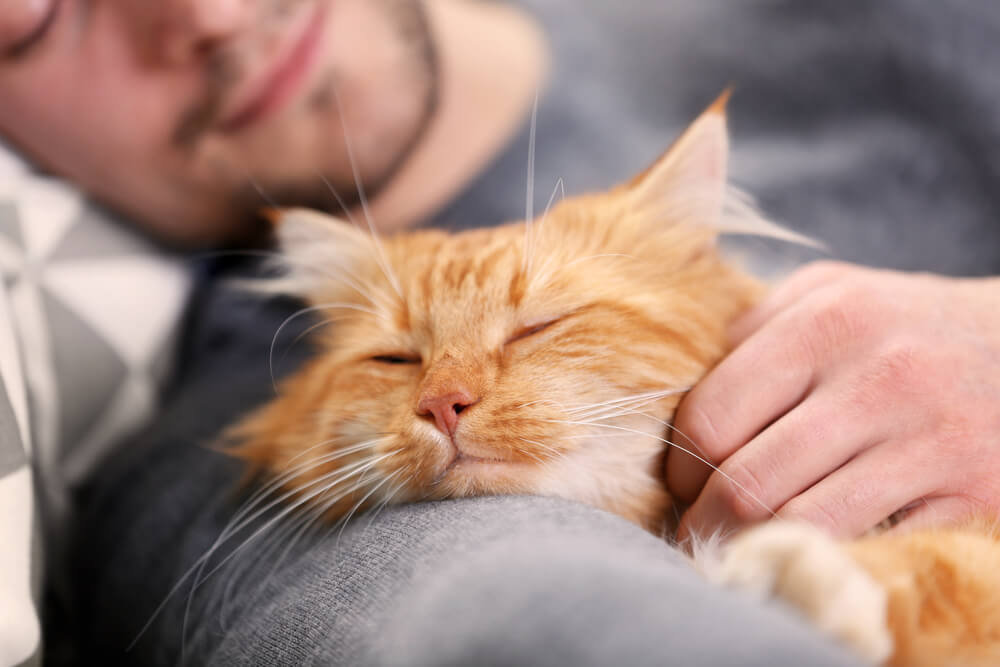
When your cat sleeps with you and rubs their face on you or your pillow, they are leaving a scent that marks you as theirs!
Cats have scent glands that release a type of chemical signal called pheromones. These glands are mainly found around the head (the cheeks, under the chin, on the forehead, and at the corners of the mouth). Pheromones are used amongst cats for communication.
Cats will often mark places they frequently occupy for territorial purposes. So when your cat sleeps with you and rubs their face on you or your pillow, they are leaving a scent that marks you as theirs! The scent also indicates familiarity and safety. In turn, this increases their sense of security and reduces their anxiety around you.
Also Read: Do Cats Have Scent Glands In Their Paws?
They Want To Form And Sustain A Bond With You

Cats don’t just release pheromones to mark their territory.
Cats don’t just release pheromones to mark their territory. When they are part of the same social group, cats will rub against and groom each other. These activities are properly known as ‘allorubbing’ and ‘allogrooming.’ While they are doing this, pheromones are transferred between them to form a ‘group scent.’ This strengthens their social and emotional bonds.
You might have woken up to your cat’s rough tongue licking your head back and forth and wondered why they were performing this strange behavior. Licking your hair is likely an extension of allogrooming. Cats will lick (as well as rub against) people to whom they feel closely attached. Consider it a privilege that your cat officially views you as a member of their group!
They Find It Comforting
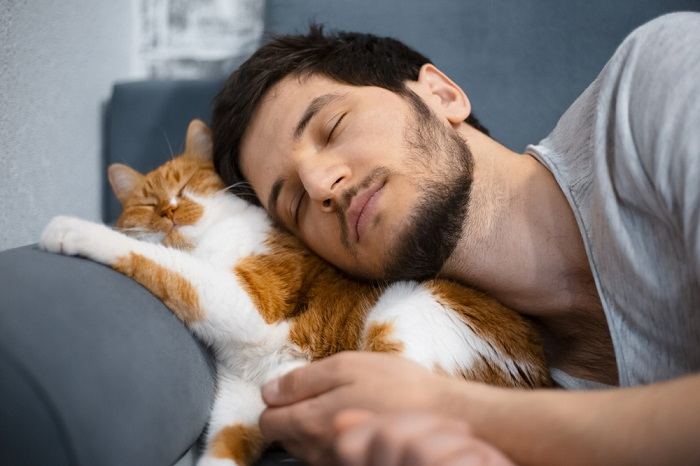
By staying as close to you as possible, it can give them that same sense of comfort.
When your cat was a kitten, they would have spent a lot of time huddled together with their siblings. Litters of kittens are often found piled on top of each other next to their mother. Sleeping on your head can simply be a continuation of that habit as they grow older. By staying as close to you as possible, it can give them that same sense of comfort.
Also Read: Top 11 Best Cat Litters For Kittens
They Do It To Show Their Affection For You
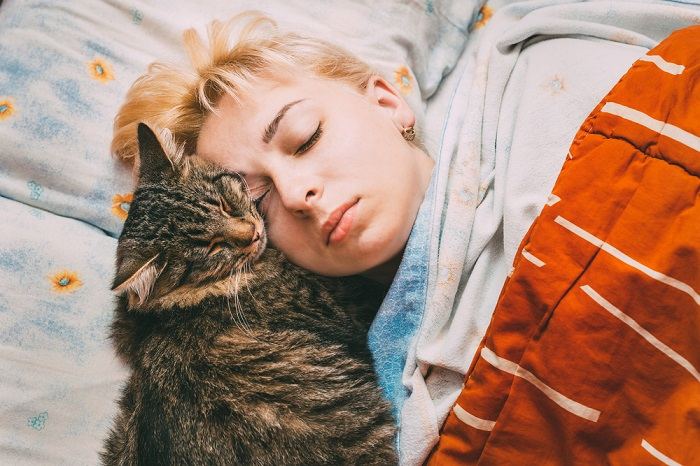
A study even showed that most cats prefer social interaction with people over food and toys!
Cats are often misunderstood as distant and independent. Yes, they may like their personal space and to have things done on their terms. But they can also be incredibly affectionate companions. A study even showed that most cats prefer social interaction with people over food and toys! Sleeping with you can simply be a way for them to express their love for you.
Also Read: 6 Subtle Signs Your Cat Loves You
A Few Reasons Why You Might Not Want to Sleep With Your Cat
Disruption Of Your Sleep
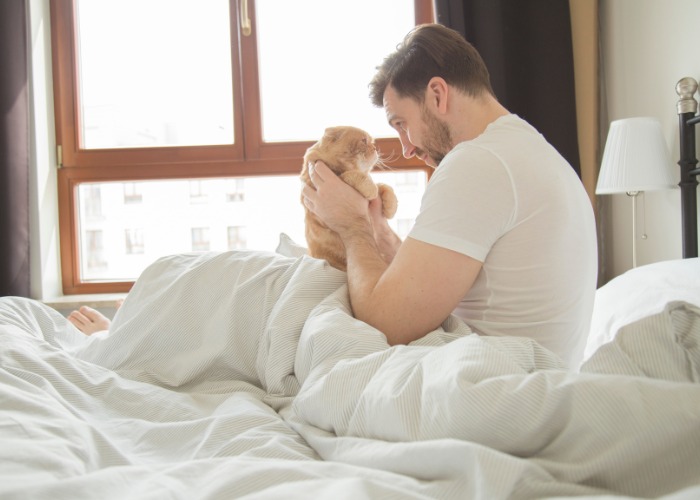
They are ‘crepuscular’ creatures, so they are most active at dawn (before sunrise) and dusk (after sunset).
Cats seem to spend most of their time sleeping. On average, they snooze for 15 hours a day! This might make them seem like the perfect sleeping companion. However, your cat’s sleep pattern is different from yours.
They are ‘crepuscular’ creatures, so they are most active at dawn (before sunrise) and dusk (after sunset). This means they might be awake while you are still sleeping and disturb you in the hopes that you will play with or feed them. See the FAQ below for steps to prevent this from happening.
Risk Of Infection And Illness
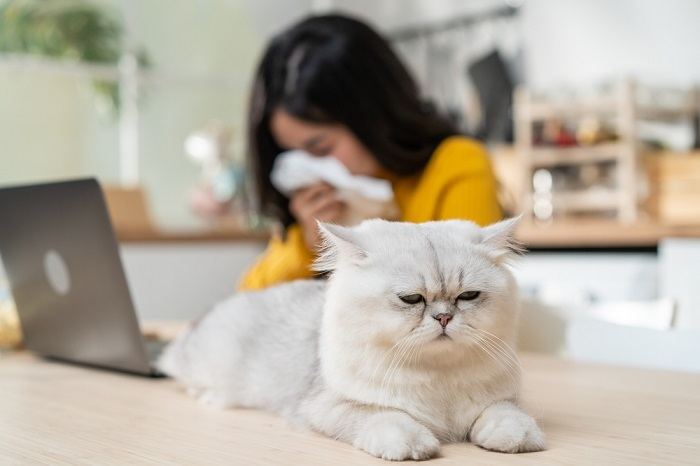
If you and your cat are both healthy, then the risk of you getting a disease from your cat is low.
Sleeping with your cat can increase the risk of exposure to parasites, such as fleas and intestinal worms. Bacteria, like Salmonella and Campylobacter, can also spread from cats and cause illness in people.
If you and your cat are both healthy, then the risk of you getting a disease from your cat is low. Young children or people with a weakened immune system should avoid sleeping with their cats.
Also Read: Science Confirms That People Who Own Cats Are Healthier
Reasons Why You Should Sleep With Your Cat
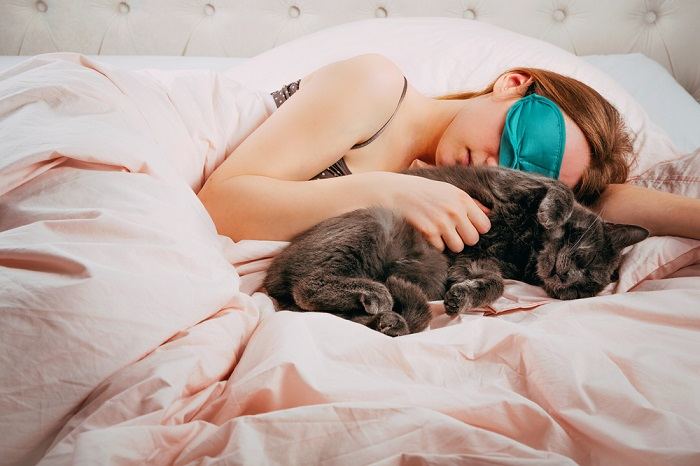
Sleeping with your cat has many positive aspects.
Sleeping with your cat has many positive aspects. You might find yourself falling asleep more easily. Their presence can relieve stress and anxiety. Your cat will also keep you warm and provide you with a sense of security – mutual benefits!
Summary
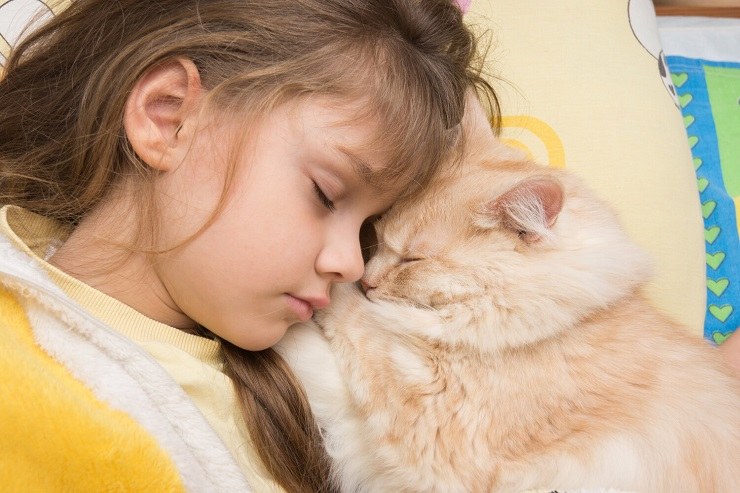
Next time you find your cat sleeping on your head, you’ll have a better understanding of why they choose to do this and how it can benefit you both.
Next time you find your cat sleeping on your head, you’ll have a better understanding of why they choose to do this and how it can benefit you both. It is one of many ways to reinforce the bond you have with each other.
If you choose to continue sleeping with your cat, remember to practice good hygiene, like regular hand washing and cleaning of litter trays. Make sure your cat gets a yearly wellness examination and is up to date with their vaccinations.
Your veterinarian will advise on a protocol for parasite prevention. By taking these steps, you can rest at ease (unless, of course, your cat wakes you up at 4 am!).
Also Read: The 10 Best Cat Slow Feeders & Puzzle Feeders
-
Atkinson, T. (2018). Practical Feline Behaviour. Oxfordshire, UK: CAB International.
-
Chomel, B. B., & Sun, B. (2011). Zoonoses in the Bedroom. Emerging Infectious Diseases, 17(2), 167-172. https://wwwnc.cdc.gov/eid/article/17/2/10-1070_article.
-
Fraser, A. (2012). Feline Behaviour and Welfare. Oxfordshire, UK: CAB International.
-
Vitale Shreve, K., Mehrkam, L., & Udell, M. (2017). Social interaction, food, scent, or toys? A formal assessment of domestic pet and shelter cat (Felis silvestris catus) preferences. Behavioural Processes, 141, 322-328. doi: 10.1016/j.beproc.2017.03.016
